|
There was little else during the week other than the tensions leading up to Thursday's vote on whether the UK would leave the European Union. Even Fed Chair Janet Yellen did little to move markets with her semi-annual Congressional testimony coming just a week after the FOMC announcement and press conference. However, Friday was a different story. What had been the unknown earlier in the week became known and set off a whole range of unknowns and disaster scenarios. The Group of Seven finance ministers and central bank leaders assured ample liquidity, but that did not stem the initial volatility in the financial markets.
The equity market most affected was the Nikkei where the index slid 7.9 percent Friday. The DAX, CAC, MIB and IBEX were similarly hardest hit in Europe. While the FTSE was down, the plunge for the continental indexes was deeper. U.S. equities dropped and stayed down.
In the run up to the vote, central bankers including Federal Reserve Chair Janet Yellen indicated a victory for Brexit would destabilize global markets — a prophecy that came true at least on Friday. Central banks across Asia pledged to take action as needed to avert any breakdown in financial market liquidity. Bank of Japan Governor Haruhiko Kuroda and Japan's Finance Minister Taro Aso, whose country currently heads the Group of Seven, highlighted that six major developed nation central banks have currency swap lines at the ready to provide liquidity. South Korea and India are among those reported to have intervened to smooth trading in their currencies in Asia. The Swiss National Bank intervened on behalf of the safe haven Swiss franc.
On June 23, the UK voted by a small majority (less than 4 percentage points) to leave the European Union. The result sent shockwaves through global financial markets which had become increasingly convinced that the Remain camp would emerge victorious.
It is important to realize that whatever the final shape of the UK's new relationship with Europe, it will take years to determine. In other words, while the initial market response has been a predictably sharp kneejerk reaction, the full impact of the vote will only emerge with time. There was never a clear roadmap for what happens next in the event of Brexit and it could yet be that the decision to leave the Union ultimately proves to be the best path for the UK economy and its markets.
Not unexpectedly, the pound, which was trading above $1.50 at one point, crashed. The pound at one point was down a record 10 percent against its U.S. counterpart at $1.35, its lowest level since 1985. In addition to the dollar, a renewed flight to safety also boosted the Swiss franc and Japanese yen at the expense of the euro and higher yielding currencies. Increased risk aversion has also prompted further inflows into the more liquid government bond markets. Gold was similarly in demand. But equities tumbled.
| |
|
2015 |
2016 |
% Change |
|
Index |
Dec 31 |
June 17 |
June 24 |
Week |
2016 |
| Asia/Pacific |
|
|
|
|
|
|
| Australia |
All Ordinaries |
5344.6 |
5248.3 |
5192.83 |
-1.1% |
-2.8% |
| Japan |
Nikkei 225 |
19033.7 |
15599.7 |
14952.02 |
-4.2% |
-21.4% |
| Hong Kong |
Hang Seng |
21914.4 |
20170.0 |
20259.13 |
0.4% |
-7.6% |
| S. Korea |
Kospi |
1961.3 |
1953.4 |
1925.24 |
-1.4% |
-1.8% |
| Singapore |
STI |
2882.7 |
2763.4 |
2735.39 |
-1.0% |
-5.1% |
| China |
Shanghai Composite |
3539.2 |
2885.1 |
2854.29 |
-1.1% |
-19.4% |
|
|
|
|
|
|
|
| India |
Sensex 30 |
26117.5 |
26625.9 |
26397.71 |
-0.9% |
1.1% |
| Indonesia |
Jakarta Composite |
4593.0 |
4835.1 |
4834.57 |
0.0% |
5.3% |
| Malaysia |
KLCI |
1692.5 |
1624.2 |
1634.05 |
0.6% |
-3.5% |
| Philippines |
PSEi |
6952.1 |
7622.1 |
7629.72 |
0.1% |
9.7% |
| Taiwan |
Taiex |
8338.1 |
8568.1 |
8476.99 |
-1.1% |
1.7% |
| Thailand |
SET |
1288.0 |
1421.3 |
1413.19 |
-0.6% |
9.7% |
|
|
|
|
|
|
|
| Europe |
|
|
|
|
|
|
| UK |
FTSE 100 |
6242.3 |
6021.1 |
6138.69 |
2.0% |
-1.7% |
| France |
CAC |
4637.1 |
4193.8 |
4106.73 |
-2.1% |
-11.4% |
| Germany |
XETRA DAX |
10743.0 |
9631.4 |
9557.16 |
-0.8% |
-11.0% |
| Italy |
FTSE MIB |
21418.4 |
16923.3 |
15723.81 |
-7.1% |
-26.6% |
| Spain |
IBEX 35 |
9544.2 |
8362.0 |
7787.70 |
-6.9% |
-18.4% |
| Sweden |
OMX Stockholm 30 |
1446.8 |
1298.4 |
1360.73 |
4.8% |
-6.0% |
| Switzerland |
SMI |
8818.1 |
7713.6 |
7747.18 |
0.4% |
-12.1% |
|
|
|
|
|
|
|
| North America |
|
|
|
|
|
|
| United States |
Dow |
17425.0 |
17675.2 |
17399.86 |
-1.6% |
-0.1% |
|
NASDAQ |
5007.4 |
4800.3 |
4707.98 |
-1.9% |
-6.0% |
|
S&P 500 |
2043.9 |
2071.2 |
2037.30 |
-1.6% |
-0.3% |
| Canada |
S&P/TSX Comp. |
13010.0 |
13901.8 |
13891.88 |
-0.1% |
6.8% |
| Mexico |
Bolsa |
42977.5 |
45306.2 |
44885.820 |
-0.9% |
4.4% |
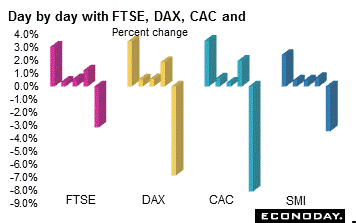 The European markets ended Thursday's session in the green, bringing their winning streak to five sessions. The gains were fueled by optimism that the UK would remain part of the European Union following the results of recent polls. And optimism drove the pound sterling to a 2016 high. Things didn't quite work out that way. The UK voted to leave the EU. European markets plunged Friday enduring their largest single session loss in nearly 8 years. Investors across the globe were shocked by the results after recent polls had provided hope that the nation would remain a member of the European Union. The European markets ended Thursday's session in the green, bringing their winning streak to five sessions. The gains were fueled by optimism that the UK would remain part of the European Union following the results of recent polls. And optimism drove the pound sterling to a 2016 high. Things didn't quite work out that way. The UK voted to leave the EU. European markets plunged Friday enduring their largest single session loss in nearly 8 years. Investors across the globe were shocked by the results after recent polls had provided hope that the nation would remain a member of the European Union.
The results of the referendum sent investors in a search for safe havens. The Swiss franc, gold and U.S. treasuries all rose sharply. Meanwhile, the pound sterling plummeted to a 31-year low. Equities plunged. However, gains earlier in the week softened the weekly results. Interestingly, the FTSE was up 2.0 percent on the week despite sinking 3.1 percent Friday. Similarly, the SMI added 0.4 percent on the week after losing 2.2 percent Friday. The CAC was down 2.1 percent on the week while the DAX was 0.8 percent lower. The indexes tumbled 8.0 percent and 6.8 percent respectively on the day. The MIB and IBEX were down 7.1 percent and 6.9 percent for the week. The two indexes plunged 12.5 percent and 12.4 percent respectively Friday.
The European Union said it stands ready to launch negotiations swiftly with the UK regarding the terms and conditions of its withdrawal from the EU. President of the European Parliament Martin Schulz, President of the European Council Donald Tusk and Holder of the Presidency of the EU Council Mark Rutte met in Brussels upon the invitation of European Commission President Jean-Claude Juncker. However, it is important to note that until this process of negotiations is over, the United Kingdom remains a member of the European Union, with all the rights and obligations that derive from membership.
Earlier in the week European Central Bank President Mario Draghi hinted that risks emanating from a then potential Brexit were challenging and the ECB had taken necessary measures to overcome the impact. Speaking to the European Parliamentary committee in Brussels, Draghi noted that the bloc's uncertainty remained high and downside risks were challenging due to the continued fragile state of the global economy and geopolitical developments.
 Equities were positive for the week through Thursday — but then Brexit results were announced and shares went south. Particularly hit hard was the Nikkei thanks to the soaring value of the yen. The Sensex also plunged. In India, the Sensex fell almost 1,100 points in noon trades. However, the index recouped some losses and ended the session down 604 points. The intra-day recovery came after Finance Minister Arun Jaitley and Reserve Bank of India Governor Raghuram Rajan sought to calm investor concerns, saying a solid economy and planned government reforms would allow the country to deal with any fallout from the UK's exit from the EU. Equities were positive for the week through Thursday — but then Brexit results were announced and shares went south. Particularly hit hard was the Nikkei thanks to the soaring value of the yen. The Sensex also plunged. In India, the Sensex fell almost 1,100 points in noon trades. However, the index recouped some losses and ended the session down 604 points. The intra-day recovery came after Finance Minister Arun Jaitley and Reserve Bank of India Governor Raghuram Rajan sought to calm investor concerns, saying a solid economy and planned government reforms would allow the country to deal with any fallout from the UK's exit from the EU.
The EU referendum results sent the yen soaring above 100 to its highest level in two and a half years. Safe haven assets such as treasuries, the yen and gold came to the fore as Britain's historic European Union referendum produced a stronger than expected performance by the 'Leave' campaign. On the week, most indexes were down. The Nikkei tumbled 4.2 percent while both the Shanghai Composite and All Ordinaries were 1.1 percent lower. However, the Hang Seng managed a 0.4 percent gain.
In a surprise move, highly respected RBI Chief Raghuram Rajan announced that he will quit his job after serving just one three year term at the RBI. He will be leaving the Bank at the start of September. As a major driving force behind the ongoing reform of the RBI — notably the creation of a monetary policy committee with responsibility for interest rates — his departure will be a disappointment to the financial markets. A number of corporate leaders have also expressed their shock and disappointment.
Under Rajan, policy has become increasingly focused on meeting a 5 percent inflation target set for March 2017 and a 4 percent medium-term objective later in the year. With Indian economic growth underperforming government hopes, this has typically meant keeping official interest rates at high and politically sensitive levels, much to the angst of PM Narendra Modi and his administration. Clashes between the two sides have become a familiar feature of the domestic economic scene in recent months.
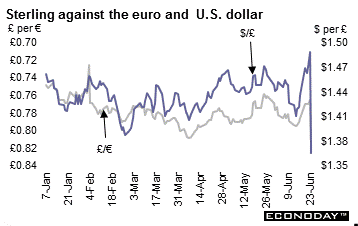 The U.S. dollar was up against the pound sterling, euro, Swiss franc and the Canadian dollar. However, the currency retreated against the Australian dollar and the yen. The U.S. dollar was up against the pound sterling, euro, Swiss franc and the Canadian dollar. However, the currency retreated against the Australian dollar and the yen.
Currencies fluctuated wildly Friday after the UK voted to leave the European Union. The pound sterling plummeted, taking the euro with it while the yen and U.S. dollar climbed. Early Friday, the Japanese yen surged through the 100 level briefly against the dollar, prompting comments from the nation's Finance Minister Taro Aso that he will respond if necessary. The 100 level for the Japanese currency was the highest since November 2013.
After climbing to above $1.50, sterling tumbled to its weakest level since 1985 as the election returns became evident that the UK would leave the European Union. The plunge was the currency's worst day on record, exceeding the 4.1 percent drop on 1992's Black Wednesday when the pound was forced out of Europe's exchange-rate mechanism. Sterling declined to its weakest level in more than two years against the euro. The British currency had gyrated since the official campaign began in February.
|
|
2015 |
2016 |
% Change |
|
|
Dec 31 |
June 17 |
June24 |
Week |
2016 |
| U.S. $ per currency |
|
|
|
|
|
|
| Australia |
A$ |
0.7288 |
0.740 |
0.747 |
1.0% |
2.5% |
| New Zealand |
NZ$ |
0.6833 |
0.707 |
0.712 |
0.7% |
4.2% |
| Canada |
C$ |
0.7231 |
0.777 |
0.770 |
-0.9% |
6.4% |
| Eurozone |
euro (€) |
1.0871 |
1.128 |
1.110 |
-1.6% |
2.1% |
| UK |
pound sterling (£) |
1.4742 |
1.436 |
1.362 |
-5.1% |
-7.6% |
|
|
|
|
|
|
|
| Currency per U.S. $ |
|
|
|
|
|
|
| China |
yuan |
6.4937 |
6.587 |
6.622 |
-0.5% |
-1.9% |
| Hong Kong |
HK$* |
7.7501 |
7.760 |
7.760 |
0.0% |
-0.1% |
| India |
rupee |
66.1537 |
67.085 |
67.969 |
-1.3% |
-2.7% |
| Japan |
yen |
120.2068 |
104.230 |
102.290 |
1.9% |
17.5% |
| Malaysia |
ringgit |
4.2943 |
4.101 |
4.093 |
0.2% |
4.9% |
| Singapore |
Singapore $ |
1.4179 |
1.348 |
1.352 |
-0.3% |
4.9% |
| South Korea |
won |
1175.0600 |
1173.050 |
1179.120 |
-0.5% |
-0.3% |
| Taiwan |
Taiwan $ |
32.8620 |
32.378 |
32.362 |
0.0% |
1.5% |
| Thailand |
baht |
36.0100 |
35.230 |
35.266 |
-0.1% |
2.1% |
| Switzerland |
Swiss franc |
1.0014 |
0.9599 |
0.9731 |
-1.4% |
2.9% |
| *Pegged to U.S. dollar |
|
|
|
|
|
|
| Source: Bloomberg |
|
|
|
|
|
|
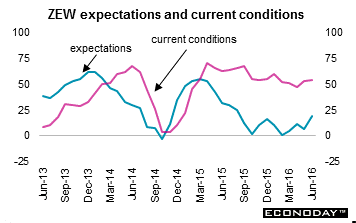 According to the June ZEW survey, analysts have become more optimistic this month about both the current and future state of the German economy. The current conditions index rose 1.4 points to 54.5, its second consecutive gain following three successive declines. The June reading was also the highest since January. At the same time, expectations climbed nearly 13 points to 19.2, their largest increase since January last year and their best reading since August 2015. According to the June ZEW survey, analysts have become more optimistic this month about both the current and future state of the German economy. The current conditions index rose 1.4 points to 54.5, its second consecutive gain following three successive declines. The June reading was also the highest since January. At the same time, expectations climbed nearly 13 points to 19.2, their largest increase since January last year and their best reading since August 2015.
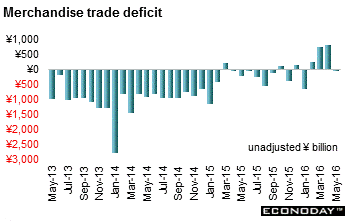 Japan's unadjusted May merchandise trade deficit was Y40.7 billion after April's surplus of Y823.2 billion. Analysts expected a surplus of Y40 billion. Exports tumbled 11.3 percent from a year ago while imports plunged 13.8 percent. While the decline in imports met expectations, exports dropped more than the expected 10.4 percent. While the decline in exports was the eighth straight, it was import's 17th consecutive decline. Imports continued to decline thanks to the lower cost of energy related products. Exports dropped to all major markets. On the year, exports to Asia (down 13.0 percent), China (down 14.9 percent), United States (down 10.7 percent) and the EU (down 4.0 percent) dropped. On a seasonally adjusted basis, Japan's trade surplus was Y269.8 billion after Y397.0 billion in April. In May, exports were down 1.3 percent while imports were up 1.0 percent. Japan's unadjusted May merchandise trade deficit was Y40.7 billion after April's surplus of Y823.2 billion. Analysts expected a surplus of Y40 billion. Exports tumbled 11.3 percent from a year ago while imports plunged 13.8 percent. While the decline in imports met expectations, exports dropped more than the expected 10.4 percent. While the decline in exports was the eighth straight, it was import's 17th consecutive decline. Imports continued to decline thanks to the lower cost of energy related products. Exports dropped to all major markets. On the year, exports to Asia (down 13.0 percent), China (down 14.9 percent), United States (down 10.7 percent) and the EU (down 4.0 percent) dropped. On a seasonally adjusted basis, Japan's trade surplus was Y269.8 billion after Y397.0 billion in April. In May, exports were down 1.3 percent while imports were up 1.0 percent.
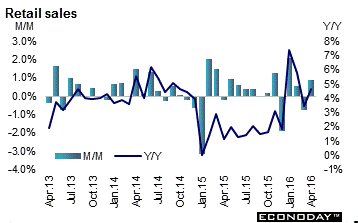 April retail sales rebounded 0.9 percent from a slightly smaller revised 0.8 percent monthly decline in March. On the year, sales were up 4.6 percent after March's 3.5 percent gain. However, prices rose quite sharply (notably for gasoline) while volumes significantly underperformed their nominal counterpart with a minimal 0.1 percent monthly increase. Seven of the 11 reporting subsectors increased sales on the month. Within these gasoline (6.0 percent) saw their first advance since June 2015 and furniture & home furnishings gained 6.1 percent. Miscellaneous stores (3.7 percent), building materials & garden equipment (1.6 percent) and general merchandise (1.3 percent) also had a good month. However autos, parts & accessories declined 0.3 percent while sporting goods, books & hobbies retreated 0.9 percent and electronics & appliances slipped 0.3 percent. April retail sales rebounded 0.9 percent from a slightly smaller revised 0.8 percent monthly decline in March. On the year, sales were up 4.6 percent after March's 3.5 percent gain. However, prices rose quite sharply (notably for gasoline) while volumes significantly underperformed their nominal counterpart with a minimal 0.1 percent monthly increase. Seven of the 11 reporting subsectors increased sales on the month. Within these gasoline (6.0 percent) saw their first advance since June 2015 and furniture & home furnishings gained 6.1 percent. Miscellaneous stores (3.7 percent), building materials & garden equipment (1.6 percent) and general merchandise (1.3 percent) also had a good month. However autos, parts & accessories declined 0.3 percent while sporting goods, books & hobbies retreated 0.9 percent and electronics & appliances slipped 0.3 percent.
The UK opted to leave the European Union in Thursday's election. Fed Chair Janet Yellen testified before Senate and House of Representatives committees. Given that only a week before, the FOMC announced its policy decision and Dr Yellen held her quarterly press conference, there was little new information.
The economic calendar is heavy in the coming week. Final manufacturing PMIs for June will be posted in Europe, Asia and the U.S. German unemployment and retail sales will give a reading on the pulse of German activity. In Japan, the usual last week of the month data including unemployment, retail sales, industrial production and household spending for May will be reported. The Bank of Japan's second quarter Tankan will also be released.
Investors will have the weekend to sort out the various ramifications of Brexit. There is no precedent for leaving the European Union. This will inject an ongoing level of uncertainty for years. Once the UK notifies the EU of its intention to leave, there is a two year period of negotiation before the final break. Meanwhile, central banks have assured investors that there is ample liquidity and that they will act to prevent any disruption.
| The following indicators will be released this week... |
| Europe |
|
|
| June 27 |
Eurozone |
M3 Money Supply (May) |
|
Germany |
Retail Sales (May) |
| June 29 |
Eurozone |
EC Business and Consumer Sentiment (June) |
| June 30 |
Eurozone |
Harmonized Index of Consumer Prices (June flash) |
|
Germany |
Unemployment (June) |
|
France |
Consumption of Manufactured Goods (May) |
| July 1 |
Eurozone |
Manufacturing PMI (June final) |
|
Germany |
Manufacturing PMI (June final) |
|
France |
Manufacturing PMI (June final) |
|
Italy |
Manufacturing PMI (June final) |
|
Spain |
Manufacturing PMI (June final) |
|
UK |
Manufacturing PMI (June final) |
| |
|
|
| Asia/Pacific |
|
|
| June 29 |
Japan |
Retail Sales (May) |
| June 30 |
Japan |
Industrial Production (May) |
| July 1 |
Japan |
Consumer Price Index (May) |
|
|
Household Spending (May) |
|
|
Unemployment (May) |
|
|
Tankan Survey (Q2.2016) |
|
|
Manufacturing PMI (June final) |
|
China |
Manufacturing PMI (June) |
|
|
CFLP Manufacturing PMI (June) |
| |
|
|
| Americas |
|
|
| June 30 |
Canada |
Monthly Gross Domestic Product (April) |
|
|
Industrial Product Price Index (May) |
Anne D Picker is the author of International Economic Indicators and Central Banks.
|

